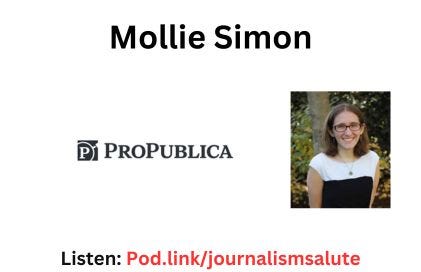Journalism Salute: Mollie Simon, Doer of Research, Interviewer of Documents
Mollie is an integral part of the behind-the-scenes work in ProPublica's investigations. She shares her perspective, advice for researchers
At the end of a wonderful interview I did with ProPublica reporter Jennifer Berry Hawes in January, she enthusiastically suggested I speak with someone else at ProPublica, research reporter Mollie Simon.
Note: The headline of this newsletter issue is a play on Mollie’s Twitter bio, which reads “eater of chocolate/baker of bread/finder of facts
Mollie gets bylines on the long stories and projects that ProPublica does but her work is different from most others in that newsroom. It's much more behind the scenes.
I was excited to speak to Mollie, not just to talk to another Simon (we don't appear to be related) but to speak to another researcher. That job at ESPN (where I worked for nearly 16 years) is different from the work her and her seven colleagues do, but the spirit of it is still the same. So it was great to compare notes.
I can remember two projects I worked on for Outside the Lines. One was grouping every player listed in The Mitchell Report (the list of PED users) by manager. Another was going through TV scripts word-for-word for a town hall in San Francisco about Barry Bonds. The diligence necessary for those two projects is the same for Mollie in the dozens of projects she's worked on, such as one on “We Buy Ugly Houses.”
You really should listen to this episode to learn what she does and to get the advice she gave to future researchers. Here's a few of the highlights (edited for clarity).
Mollie's inspirations: Her grandmother and science fairs
"She started making lectures on various topics that involved history. Everything from Jewish department stores to presidents. She was one of many people in my life that encouraged a lot of question asking."
"When I was growing up, the science fair was a huge thing in my household. It was something we spent a lot of time on and thought a lot about and really tried to do a good job on. I think that early learning the scientific scientific process and coming up with a hypothesis, asking questions, trying to poke holes in something to prove why you know something, I think that really plays into the research I do today."
One day you're looking for old news clippings, another you're tracking down potential sources, another you're figuring out patterns in information as you put data into spreadsheets
"It's a lot of different things. It comes down to finding information, finding good sources, seeing what's already out there and helping reporters as they seek out information."
"I don't think I've ever worked on a project that didn't involve a spreadsheet. You're looking for patterns but also recognizing when something might not be a pattern."
This is the kind of journalism work that Mollie prefers rather than traditional reporting
"Thaat's not the piece of journalism where I'm most at home. I've used this cliché: I like interviewing documents more than people sometimes. There's certainly parts of our work where I'm interviewing experts and court clerks and asking how things work and I'm very at home in that setting. In journalism, within research, this is the kind of work I love. So I'm excited to keep doing these kinds of projects."
The skills needed to do this job well are …
"Just a willingness to ask a lot of questions. And I think building that skill of asking a lot of questions and learning to be the person that dives into footnotes and takes a lot of time with documents and looks deeply at the information in front of you."
"Learning to use the databases around you, where you can search and knowing when to Google and when there's more to see than what's on Google."
And she recommends this job very much for a certain type of person
"With many career fields, it's obvious, easy to see the main word for a job, like doctor or lawyer or journalist.
But I think to really understand what you wanna do, you have to dig into what are the sub-things. I would just encourage people to think about what the detailed sub-jobs are that you might do and what those titles look like and really what they mean and what the differences are for what your workday might look like."
Again, this was a great conversation. Hope you'll listen to the interview and share it with the aspiring journalists in your lives. If you have a suggestion for a guest you’d like to hear, email me at journalismsalute@gmail.com




